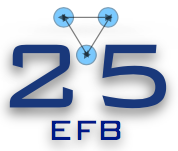Speaker
Description
The leading-order (LO) Halo EFT interactions for shallow states beyond $S$-waves exhibit non-negligible energy dependencies leading to difficulties related to the normalization. Recently, purely momentum-dependent potentials with square-root form factors have been investigated for the NN and the 3N system [e.g., S. R. Beane et al. (2022), R. Peng et al. (2022) , V. S. Timoteo et al. (2023)]. They have also been applied to the two-neutron halo nucleus $^{6}$He [Q. Li et al. (2023)].
In this talk, I will present our work on developing a scheme of purely momentum-dependent LO potentials for shallow states in different partial waves. Thereby, we present a method to determine the minimal number of coupling constants necessary to renormalize the theory for a shallow state in an arbitrary partial wave. This in turn defines the LO potential which reproduces the effective range expansion of the T-matrix up to the effective range parameter (ERP) needed in order to have a renormalization scale independent T-matrix while it sets all higher order ERPs exactly to zero. We apply this formalism for both a shallow $P$-wave bound (e.g., $^{31}$Ne) as well as a resonance (e.g., $n$-$\alpha$ system) state.
This work was supported by the Deutsche Forschungsgemeinschaft (DFG, German Research Foundation) - Project-ID 279384907 - SFB 1245 and by the German Federal Ministry of Education and Research (BMBF) (Grant no. 05P21RDFNB).

